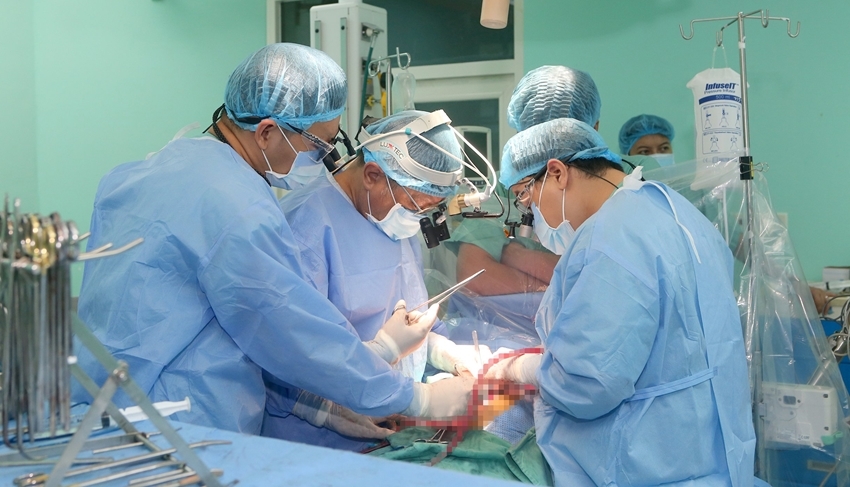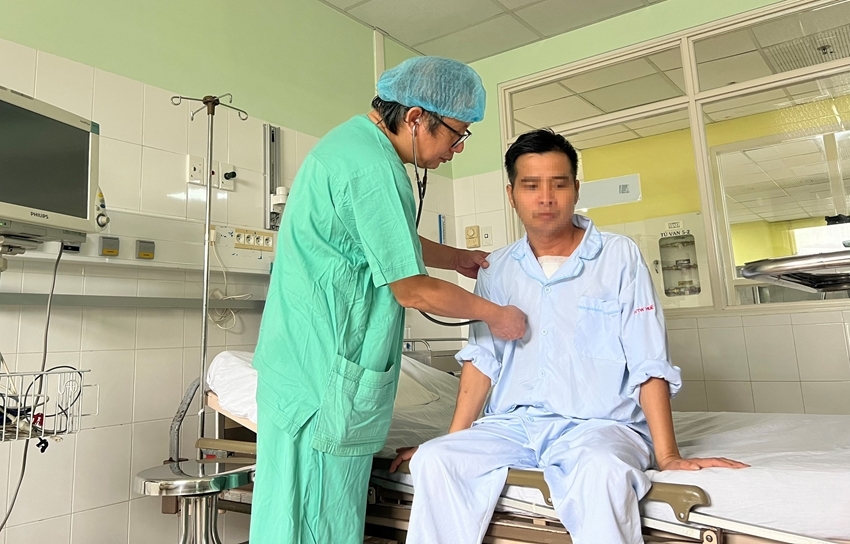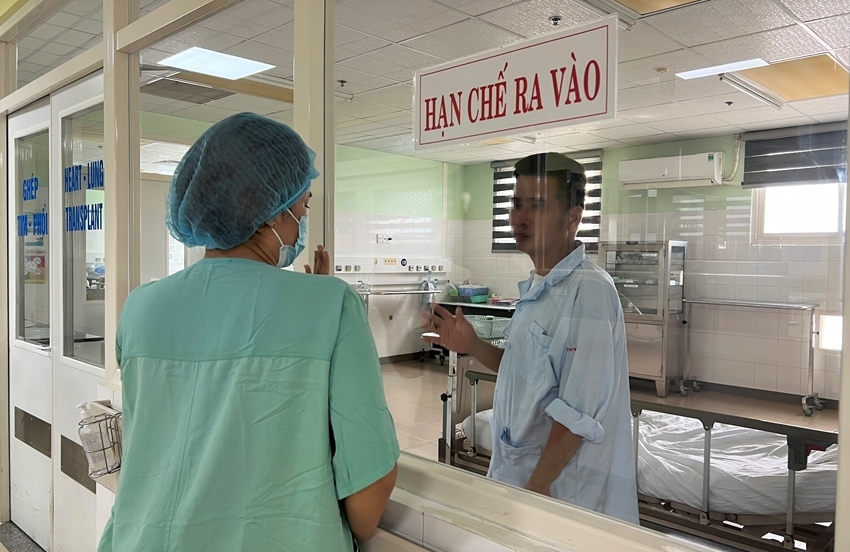 |
| The heart transplant team for patient P.T.T. from the organ donor in Hanoi |
A special transplant
On July 17, upon receiving information from the National Organ Donation Coordination Center about a brain-dead donor in Hanoi, Prof. Dr. Pham Nhu Hiep – Director of HCH immediately gathered the team to receive and coordinate the organ. The hospital’s doctors were dispatched to work with Viet Duc Hospital and the National Organ Donation Coordination Center to receive the organ.
The donor was a 65-year-old female, who was relatively lightweight. Selecting a recipient for the heart was challenging due to the high risks associated with transplantation, as doctors only prioritized emergency cases or patients with severe end-stage heart failure who agreed to receive a heart from an older donor. Among those waiting for a heart transplant, 43-year-old P.T.T. from Quang Nam met all compatibility factors. After explaining the risks and the fact that the donor was older, the patient and their family agreed to take the heart.
This was indeed a difficult transplant. The patient had previously undergone valve replacement surgery nearly 9 years ago. The donor’s organ had a mismatch in body indices with the recipient. Receiving a heart from Hanoi required minimizing the time of cold ischemia. Besides external factors, the surgical team had to dissect the entire heart and major blood vessels, which took considerable time. Therefore, the support of an external circulation system was necessary to stabilize hemodynamics and optimize blood flow to other organs.
After discussing and calculating the time for organ retrieval at Viet Duc Hospital (Hanoi) and preparing the recipient at HCH, thanks to the professional coordination between departments, the heart transplant was completed. 4 hours and 52 minutes after receiving the heart and transporting it to HCH, the “Hanoi heart” began to beat strongly in the patient’s chest at 11:01 PM on July 18.
Dr. Specialist II. Tran Hoai An – Senior Specialist at Hue Central Hospital’s Cardiovascular Center recalled: “To ensure safety for the transplant, we placed a cannula in the thigh to empty the heart, facilitating safe dissection. Transplanting a heart into a patient who has previously undergone surgery is a complex technique and retrieving the organ from afar required precise time management. Changes in surgical techniques, quick and precise operations, and minimizing myocardial ischemia time would help the heart recovery early after surgery.”
 |
| Dr. Specialist II. Dang The Uyen checking on the patient on July 30 |
Due to the unique factors associated with the donated organ and the recipient, the post-transplant resuscitation and care for this case were quite challenging. Dr. Dang The Uyen, Deputy Director of the Cardiology Center and Head of the Anesthesia and Intensive Care Department, shared: “Fortunately, the surgical team has extensive experience from performing tens of thousands of cardiovascular cases over the past 20 years. The team utilized many advanced techniques in resuscitation, including mechanical circulatory support such as intra-aortic balloon pump (IABP) and extracorporeal membrane oxygenation (ECMO), along with various medications... Thanks to the implementation of these techniques in early post-transplant recovery, after 6 days post-surgery, the patient was able to wean off mechanical support; after 10 days, the patient stopped using inotropic agents. The patient can now perform personal activities independently, and all tests have returned to normal limits.”
A miracle
Although many heart transplants have been performed, this one faced more challenges than usual. Heart transplants cannot afford to fail as they are closely linked to human life. This motivated the medical team at HCH to work tirelessly, determined to accept the rare and sacred gift to save the critically ill patient.
In the intensive care unit on July 30, patient P.T.T. exercised gently and practiced deep breathing to increase lung ventilation. Mr. T. spoke with a choked voice: “I feel much better now. Thank you to the donor’s family and the medical team for their dedicated care. Having experienced multiple resuscitations due to cardiac arrest and being on the brink of death, now having another chance to live,I have no words to describe this joy.”
 |
| Mr. T.'s wife supports him after the heart transplant |
Recently, Mrs. N.T.L., Mr. T.'s wife, has left her job as a caregiver to take care of her husband. She pressed her hand against the glass of the hospital room, tears in her eyes, signaling to check on his condition. When she saw Mr. T. smile, she waved to indicate he should rest to avoid getting tired. Mrs. L. shared: “For the past few days, our children and members from both sides of the family have been inquiring about him constantly. After being at HCH for about 2 months, my husband received a heart transplant. Everyone says it’s an incredibly rare stroke of luck. I am deeply grateful to everyone who has cared, supported, and contributed to the cost of the heart transplant for him.”
This emergency heart transplant with a patient who had previously undergone surgery created significant pressure in performing the surgical techniques. Prof. Dr. Pham Nhu Hiep, Director of HCH, stated: “We calculated that the time for retrieving and transporting the heart to Hue needed to be as short as possible. At the same time, the preparation time for the recipient also needed to be optimal. This achievement was made possible by our substantial human resources, high technical expertise, and extensive experience in saving critically ill patients. It can be considered a special event in the history of heart transplants across Vietnam at HCH.”
The success of the heart transplant was thank to the coordination of various units, such as the National Organ Donation Coordination Center, Viet Duc Hospital; support from Vietnam Airlines, Noi Bai International Airport, Phu Bai International Airport; and traffic police.
To date, HCH has routinely performed around 2,000 transplants of tissues, organs, and stem cells for patients across the country, contributing to the revival of many lives on the brink of death.